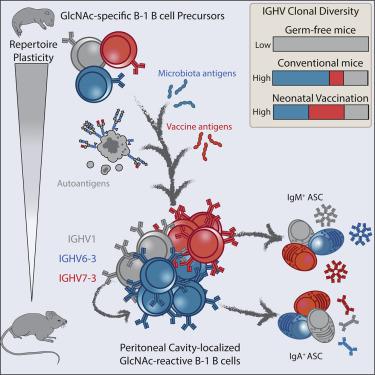Immunity ( IF 25.5 ) Pub Date : 2020-06-30 , DOI: 10.1016/j.immuni.2020.06.006 J Stewart New 1 , Brian L P Dizon 2 , Christopher F Fucile 3 , Alexander F Rosenberg 4 , John F Kearney 1 , R Glenn King 1

|
B-1 B cells derive from a developmental program distinct from that of conventional B cells, through B cell receptor (BCR)-dependent positive selection of fetally derived precursors. Here, we used direct labeling of B cells reactive with the N-acetyl-D-glucosamine (GlcNAc)-containing Lancefield group A carbohydrate of Streptococcus pyogenes to study the effects of bacterial antigens on the emergent B-1 B cell clonal repertoire. The number, phenotype, and BCR clonotypes of GlcNAc-reactive B-1 B cells were modulated by neonatal exposure to heat-killed S. pyogenes bacteria. GlcNAc-reactive B-1 clonotypes and serum antibodies were reduced in germ-free mice compared with conventionally raised mice. Colonization of germ-free mice with a conventional microbiota promoted GlcNAc-reactive B-1 B cell development and concomitantly elicited clonally related IgA+ plasma cells in the small intestine. Thus, exposure to microbial antigens in early life determines the clonality of the mature B-1 B cell repertoire and ensuing antibody responses, with implications for vaccination approaches and schedules.
中文翻译:

新生儿暴露于共生细菌衍生抗原会指导多糖特异性B-1 B细胞库的发育。
B-1 B细胞是通过发育依赖于B细胞受体(BCR)的胎儿衍生前体的阳性选择而得自不同于常规B细胞的发育程序。在这里,我们使用与含有N-乙酰基-D-葡萄糖胺(GlcNAc)的兰斯菲尔德A组化脓性链球菌碳水化合物反应的B细胞的直接标记,以研究细菌抗原对新兴B-1 B细胞克隆成分的影响。GlcNAc反应性B-1 B细胞的数量,表型和BCR克隆型是通过新生儿暴露于热灭活的化脓性链球菌来调节的。菌。与传统饲养的小鼠相比,无菌小鼠的GlcNAc反应性B-1克隆型和血清抗体降低。用常规微生物菌群对无菌小鼠的定殖促进了GlcNAc反应性B-1 B细胞的发育,并在小肠中引起了克隆相关的IgA +浆细胞。因此,在生命的早期暴露于微生物抗原决定了成熟的B-1 B细胞库的克隆性并随之产生抗体反应,这对疫苗接种方法和时间表产生了影响。











































 京公网安备 11010802027423号
京公网安备 11010802027423号